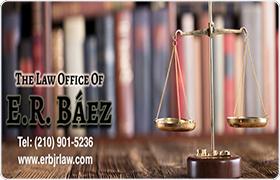Macdona RICO Act Lawyer, Texas
Sponsored Law Firm
-
 x
x

Click For More Info:
-
The Law Office of E.R. Báez
700 N. Saint Mary's Street Suite 1400 San Antonio, TX 78205» view mapCriminal Defense Law The Pastor Lawyer
Every client is special to us and every client will be treated with respect and dignity. No matter how difficult the case may be, Mr. Báez will treat you with the upmost dignity.
800-903-7181
Not enough matches for Macdona RICO Act lawyer.
Below are all Macdona Criminal lawyers.
Floyd S. Rivera
DUI-DWI, Family Law, Personal Injury, , Mass Torts
Status: In Good Standing Licensed: 34 Years
Joseph Anthony Renteria
Family Law, Personal Injury, Criminal, Litigation
Status: In Good Standing Licensed: 35 Years
Valeria Benavides
Family Law, Criminal, Personal Injury, Car Accident
Status: In Good Standing Licensed: 15 Years
Patrick James Toscano
Family Law, Criminal, Personal Injury, Accident & Injury
Status: In Good Standing Licensed: 25 Years
 E.R. Báez San Antonio, TX
E.R. Báez San Antonio, TX Practice AreasExpertise
Practice AreasExpertise
